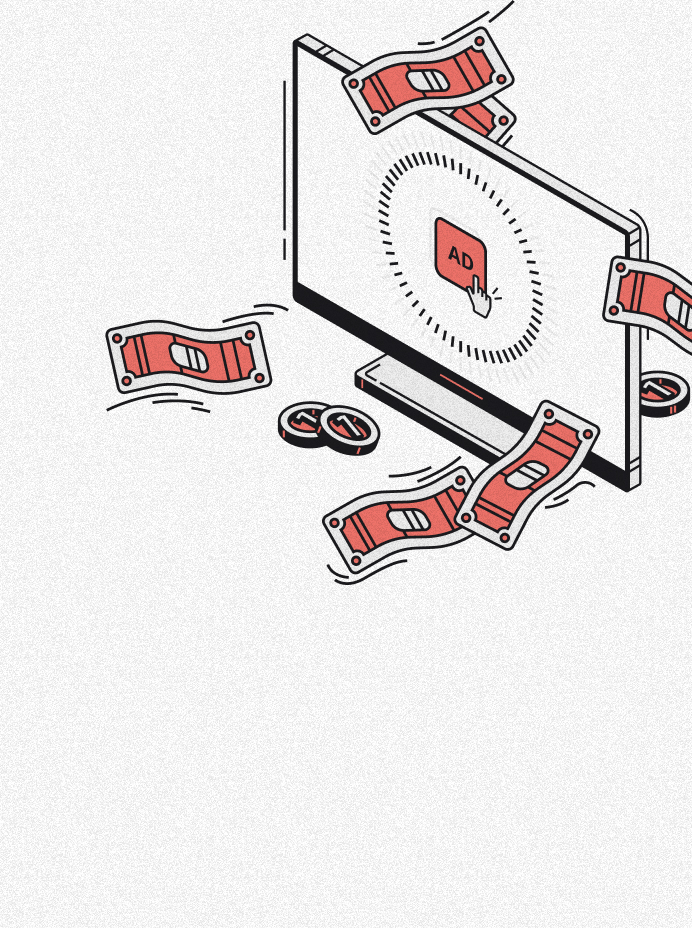PPC FAQs – introducing the world of pay-per-click advertising
4th May 2023

For this blog, we’ve sat down with our very own PPC expert, Arun, and answered some of the most common questions related to paid search advertising.
What is PPC and how does it work?
PPC stands for ‘Pay-Per-Click’. The main purpose of PPC is to have your ad show as high as possible on the Google search engine results page. Usually, people will aim to show up as the number 1 result.
This is done by bidding on keywords you think are relevant. You will be in competition with other advertisers. The process works like an auction. Usually, the advertiser with the highest bid will have their ad shown first.
However, there are other factors that come into play. The position your ad shows up in is called ‘Ad Rank’. This is determined by two factors, which are: ‘Max CPC (Cost Per Click) and ‘Quality Score’. The quality score is marked out of ten and is based on the following three factors: ‘Expected CTR (Click-Through-Rate)’, ‘Ad Relevance’ and ‘Expected Landing Page Experience’.
What is a PPC campaign?
A PPC campaign will contain ad groups, which will contain keywords and ads. A campaign will have a particular theme, such as a range of products or a specific location. Often, your campaign structure will mirror how your products or services are laid out on your website.
How much does PPC cost?
There is no definitive answer.
This will be different for everybody, based on the industry you are targeting and your budget. For example, if you run an e-commerce store, you may want to run shopping ads. You may find your average CPC is cheap, at around £1. However, in industries such as insurance, the average CPC is very high, at around £20.
Is PPC expensive?
This depends on your budget. The more expensive your clicks are, the fewer clicks you will receive. You control how much you want to spend.
When should I use PPC?
PPC can be used most effectively when you know there is an already existing large audience that is actively seeking your products or services.
If your product is something that hasn’t been seen before, then you first need to educate the public about it before you start running ads. Think about it this way – paid search is one of the best methods for capturing demand, not generating it.
Also, if you have a product or service that people don’t know they need yet, then there also must be a different strategy around this. If people don’t know about something or don’t know they need it, they won’t look for it. Therefore, your ads will receive a low number of clicks and very few conversions.
Why is PPC important? Why should I use it?
PPC is a fast way to determine whether people are interested in your product or service.
It may take months or even years to get on page 1 organically for your top targeted keywords. In some cases, you may never get there due to the competition. But that isn’t stopping you from paying for it – it’s possible to get to the top of page 1 as soon as your ads are approved.
Should I bid on my brand name?
We recommend bidding on your brand name.
We conducted a test where we paused the brand name bidding campaign for one of our clients. We thought that the conversions would remain the same for organic and paid search combined.
However, we found that the number of conversions halved compared to the previous two-week period. Conversions were steady in the months before this experiment, so seasonality was ruled out as a factor.
What is the difference between SEO and PPC?
In short, SEO is a long-term strategy that is ‘free’. And by ‘free’ we mean that you don’t have to pay for it directly to Google. However, depending on your situation, you might spend thousands on written content.
Whilst PPC can get you quick wins in the beginning, but it costs money.
Does PPC affect my SEO?
PPC and SEO involve different strategies, but it is ideal to employ both. SEO takes a long time to work, so you won’t see much growth in the beginning. However, over the long term, you could rank highly for your top-targeted keywords.
This means your brand could be more well-known. You may be able to rely less on paid advertising and start to reduce your budget. SEO is very useful if you have little cash to spend. I recommend all business to focus on SEO because it can bring in a lot of customers for free, especially if you’re working on PPC already.
How long does it take to build a PPC campaign?
Around five working days is a reasonable timescale to get a PPC account built. The most important technical part is setting up the conversion tracking.
This is the most important part of building a PPC account. If this is not done or set up incorrectly, you don’t know the actions people have taken after clicking on your ads. Your data has no meaning without conversion tracking, which makes it harder to improve your campaign – in turn, making you waste more money.
Where can I see my ads?
You will see them at the top of the page when searching for relevant search phrases on Google.
Do you work on my Google Ads account?
Yes, we carry out daily checks on the accounts we manage to make sure the ads are running smoothly. We look through the search terms regularly and confirm that irrelevant search terms do not trigger your ads.
How long does it take to see results from PPC?
You will see results quickly. Whether they are good or bad will depend on how enticing people find your product or service.
What can digital ads do that I can’t do myself?
You will receive more traffic to your website by running paid ads. This could lead to more enquiries or sales. If you outsource this, you will save time and you will be in the hands of an experience paid advertiser. You can be sure that your wasted spend will be minimal.
How exactly do you ‘optimise’ a campaign? What does that entail?
People will often talk that you need the most complicated PPC strategies to get results. But in reality, PPC is not that complicated but rather straightforward. Of course, this should be taken with a grain of salt – even though PPC is not as complicated as a lot of people claim, it nevertheless requires experience & knowledge to succeed.
And these few tasks make up much of the work you carry out to optimise a campaign and make sure the account is running well:
- Pick keywords you think will be relevant.
- Check how many conversions they get.
- See the search terms that the keyword has triggered your ads for.
- Add irrelevant search terms as negative keywords so that they don’t trigger your ads again.
- If a keyword has a high cost without generating conversions, you pause the keyword.
- Conversion tracking will be tested to make sure everything is being tracked correctly.



